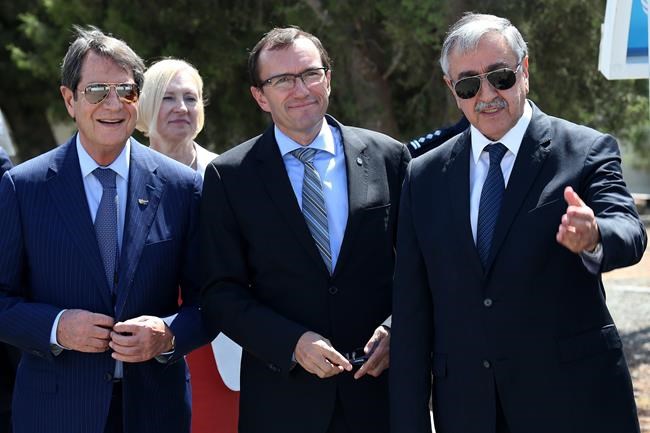Elevate your local knowledge
Sign up for the iNFOnews newsletter today!

ISTANBUL – The rival leaders of ethnically split Cyprus said Wednesday they would meet with U.N. Secretary-General Ban Ki-moon later this month to take stock of ongoing reunification talks and ask him to step up his personal involvement in the months ahead.
Cyprus President Nicos Anastasiades, a Greek Cypriot, and the breakaway Turkish Cypriot leader Mustafa Akinci, said that much progress has been achieved in 16 months of talks, but key differences remain.
The Sept. 25 meeting with Ban will cover both what the two leaders have so far agreed, but also obstacles they still face in reaching a deal that would end the island’s 42-year-old division.
The leaders “will exchange views with (Ban) and will request him to intensify his personal engagement in the process in the months to come,” the statement said following the end of an intensified, eight-meeting phase of talks held at the disused Nicosia airport inside a U.N.-controlled buffer zone.
Ban won’t be assigned any role as arbitrator during the meeting, Anastasiades said, addressing concerns of a deal being tilted to favour one side over the other.
Ban told reporters at U.N. headquarters in New York that “the United Nations is fully ready to support their initiative.”
“I’m encouraged that the Cyprus talks … continue to make very good progress with active participation and leadership and commitment of the two Cypriot leaders,” he said. “And I’m also encouraged at their strong commitment that they will complete the process within the year.”
Ban stressed that “this is a Cypriot-owned and Cypriot-led process.”
“The United Nations is facilitating this one, and you can count on us and on me,” he said.
Cyprus was split into a breakaway Turkish speaking north and an internationally recognized Greek speaking south in 1974 when Turkey invaded in the wake of a coup aimed at union with Greece.
Both leaders repeated their commitment to accelerating the U.N. mediated talks with the aim of reaching a deal this year.
The two sides say they have significantly closed the gap on issues including how to share power in an envisioned federation, the economy and how to deal with property owners abandoned during the invasion. But even on those issues, “certain substantive divergences” still remain, the statement said.
On top of that, the two sides don’t see eye to eye on post-settlement security arrangements. Turkish Cypriots want Turkey to retain military intervention rights which Greek Cypriots see as a non-starter.
“As ambitious as it may sound, an agreement is possible if there’s mutual understanding for the concerns of both communities, and especially on sensitive matters concerning the Greek Cypriot side,” Anastasiades said.
Akinci warned against allowing talks to drag on, saying the next few months must be carefully planned.
___
Associated Press writer Edith M. Lederer at the United Nations contributed to this report.
Want to share your thoughts, add context, or connect with others in your community?
You must be logged in to post a comment.